Camavinga played 75 minutes in France’s draw with Iceland. The visitors headed into half-time a goal down after Palsson opened the scoring. Nkunku and Mateta struck to turn the scores around after the break, but Hlynsson found a leveller with…
Blog
-
Google Unleashes Nano Banana in NotebookLM, Lens, and Soon Photos – PCMag
- Google Unleashes Nano Banana in NotebookLM, Lens, and Soon Photos PCMag
- Nano Banana is coming to Google Search, NotebookLM and Photos. The Keyword
- Nano Banana’s viral features are coming to more Google apps Android Police
- Gemini 2.5 Flash:…
Continue Reading
-

Why AI is being trained in rural India
Priti GuptaTechnology Reporter, Mumbai
 NextWealth
NextWealthIndia’s Virudhunagar is home to ancient temples Virudhunagar, a town in southeastern India, can boast temples that date back thousands of years.
But not far from those ancient sites, people are working on the latest tech – artificial intelligence.
One of those is Mohan Kumar.
“My role is in AI annotation. I collect data from various sources, label it, and train AI models so they can recognize and predict objects. Over time, the models become semi-supervised and can make decisions on their own,” he says.
India has long been a centre for outsourced IT support, with cities like Bangalore or Chennai being traditional hubs for such work.
But in recent years firms have been moving that work into much more remote areas, where costs for staff and space are lower.
The trend is know as cloud farming, and AI has given it another boost with numerous towns, like Virudhunagar, hosting firms working on AI.
So does Mr Kumar think he is missing out, by not being in a big city?
“Professionally, there is no real difference. Whether in small towns or metros, we work with the same global clients from the US and Europe, and the training and skills required are the same,” says Mr Kumar.
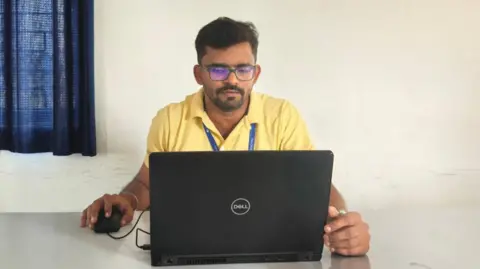 Mohan Kumar
Mohan KumarMohan Kumar prepares data used to train AI models Mr Kumar works for Desicrew. Founded in 2005 it was a pioneer in cloud farming.
“We realised that instead of forcing people to migrate to cities in search of jobs, we could bring jobs to where people already live,” says Mannivannan J K, the chief executive of Desicrew .
“For too long, opportunities have been concentrated in cities, leaving rural youth behind. Our mission has always been to create world-class careers closer to home, while proving that quality work can be delivered from anywhere.”
Desicrew does all sorts of outsourced work including software testing for start-up firms, building datasets to train AI, and moderating content.
At the moment 30 to 40% of its work is AI related, “but very soon, it will grow to 75 to 100%,” says Mr J K.
Much of that work is transcription – turning audio to text.
“Machines understand text far better,” he explains.
“For AI to work naturally, machines must be trained to understand variations in how people speak. That’s why transcription is such a crucial step, it forms the foundation for machines to comprehend and respond across languages, dialects, and contexts.”
Doing such work in a smaller town is not a disadvantage, Mr J K says.
“People often assume rural means underdeveloped, but our centres mirror urban IT hubs in every way – secure data access, reliable connectivity, and uninterrupted power. The only difference is geography. “
Around 70% of his workforce are women: “For many, this is their first salaried job, and the impact on their families is transformative – from financial security to education for their children,” says Mr J K.
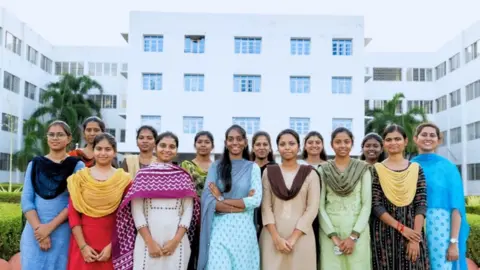 NextWealth
NextWealthAround 60% of NextWealth staff are women Founded in 2008, NextWealth was also an early mover in cloud farming.
Headquartered in Bangalore, it employs 5,000 staff in 11 offices in smaller towns across India.
“Sixty percent of India’s graduates come from small towns, but most IT companies hire only from the metros. That leaves behind a huge untapped pool of smart, first-generation graduates,” says Mythily Ramesh, co-founder and managing director of NextWealth.
“Many of these students are first-generation graduates. Their parents are farmers, weavers, tailors, policemen – families who take loans to fund their education,” she says.
NextWealth started with outsourced work from the back offices of big companies, but five years ago moved into artificial intelligence.
“The world’s most advanced algorithms are being trained and validated in India’s small towns,” says Ms Ramesh.
Around 70% of its work comes from the US.
“Every AI model, from a ChatGPT-like system to facial recognition, needs vast amounts of human-labelled data. That is the backbone of cloud-farming jobs.”
She thinks there is plenty more work to come.
“In the next 3–5 years, AI and GenAI will create close to 100 million jobs in training, validation, and real-time handling. India’s small towns can be the backbone of this workforce.”
She is hopeful that India can remain a hub for such work.
“Countries like the Philippines may catch up, but India’s scale and early start in AI sourcing gives us a five to seven-year advantage. We must leverage it before the gap narrows,” she says.
KS Viswanathan is a technology advisor, and formerly worked at India’s National Association of Software and Service Companies, the trade association for outsourcing firms.
“Silicon Valley may be building the AI engines, but the day-to-day work that keeps those engines reliable increasingly comes from India’s cloud farming industry,” he says.
“We are truly at a tipping point. If cloud farming continues to scale, small-town India could well become the world’s largest hub for AI operations, just as it became the hub for IT services two decades ago.”
But success is not guaranteed.
While Next Wealth and Desicrew both say they have access to reliable and secure internet connections, Mr Viswanathan says that is not always the case in India’s smaller towns.
“Reliable high-speed internet and secure data centres are not always at par with metros, which makes data protection a constant concern.”
Even if good connections are in place, work needs to be done to reassure clients.
“The bigger challenge is the perception rather than a technical one. International clients often assume small towns cannot meet data security standards, even when the systems are robust. Trust has to be earned through delivery.”
Back at NextWealth, Dhanalakshmi Vijay “fine-tunes” AI. For example, if it confuses two similar looking items, like a blue denim jacket and a navy shirt, she will correct the model.
“These corrections are then fed back into the system, fine-tuning the model so that the next time it sees a similar case, it performs better. Over time, the AI model builds up experience, just like updating software with regular patches to make it more accurate and reliable,” says Ms Vijay.
Such work has an effect in the real world.
“It’s me and team who indirectly train the AI models to make your online shopping experience easy and hassle free,” she says.
More Technology of BusinessContinue Reading
-

Dementia risk for people who quit smoking in middle age ‘same as someone who never smoked’ | Dementia
People who stop smoking in middle age can reduce their cognitive decline so dramatically that within 10 years their chances of developing dementia are the same as someone who has never smoked, research has found.
Kicking the habit halves the rate…
Continue Reading
-
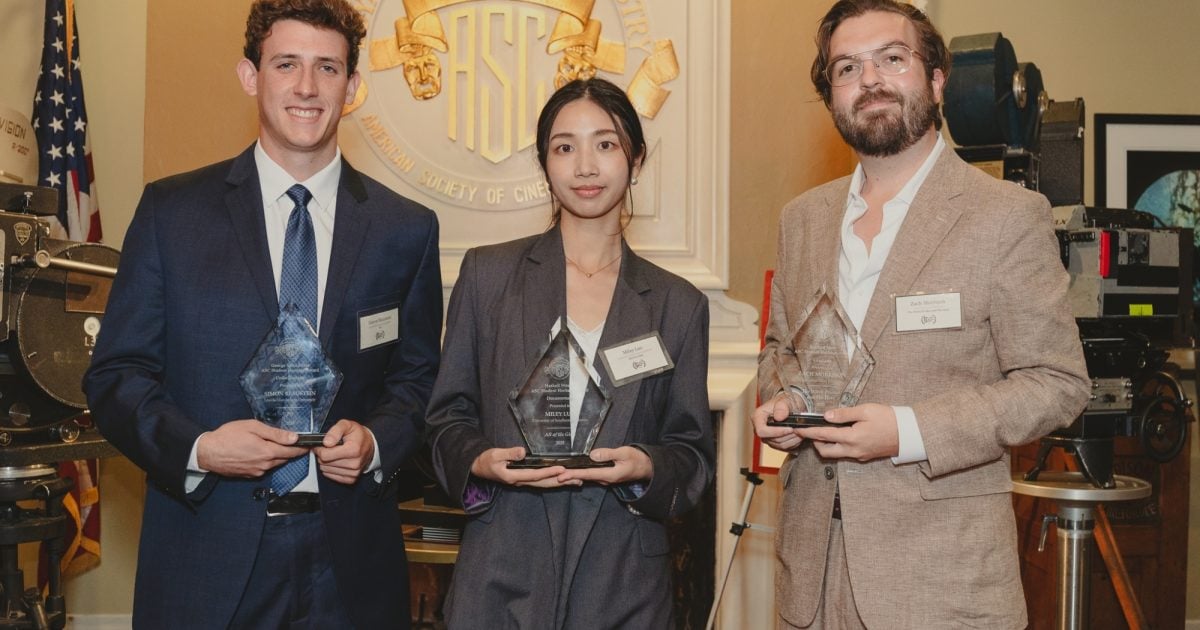
ASC Celebrates ’25 Student Heritage Award Winners, Nominees
Since 1999, the ASC Student Heritage Awards have honored the work of up-and-coming cinematographers at the university level. The awards are a pillar of the Society’s ongoing commitment to recognizing and nurturing the next generation of…
Continue Reading
-

Quitting smoking after cancer diagnosis sharply improves survival, study finds
Even in advanced cancer, patients who quit smoking soon after diagnosis lived longer, yet most were never offered meaningful cessation support.
Study: Smoking Cessation and Mortality Risk in Cancer Survivorship: Real-World Data…
Continue Reading
-

Fossil of Long and Narrow-Snouted Ichthyosaur Uncovered in England
University of Manchester paleontologist Dean Lomax and his colleagues have identified a new genus and species of leptonectid ichthyosaur from a fossilized specimen found in Dorset, England.
Life reconstruction of Xiphodracon goldencapensis….
Continue Reading
-
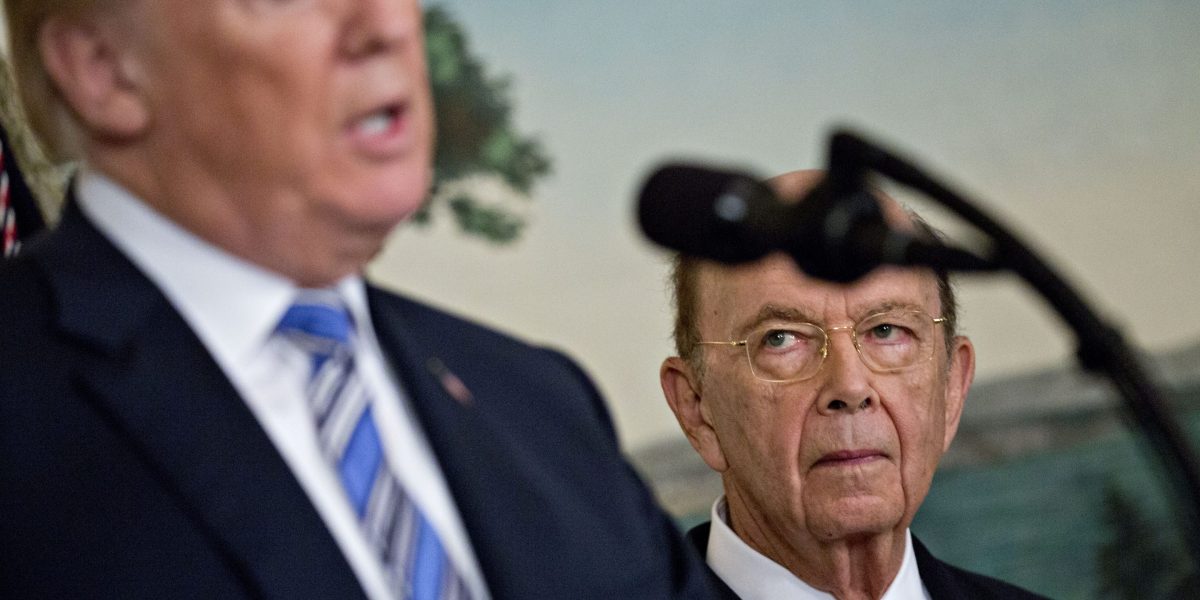
‘Rare earths are a very useful weapon for China’: Former Commerce Secretary Wilbur Ross on the big economic danger
China’s tightening grip on the minerals that power America’s high-tech is no longer a distant geopolitical concern: it’s an economic threat already moving through U.S. supply chains.
That’s the warning from Wilbur Ross, former U.S. Secretary of Commerce under President Donald Trump, who says Beijing has learned how to use rare earth minerals as leverage over the United States, and may be preparing to weaponize supply chains even further.
“Rare earths are a very useful weapon for China,” the private equity mogul told Fortune in an interview. “For giving up a little bit of revenue, they are achieving a pretty good bang for the buck.”
China doesn’t control most of the world’s rare earth mines, but it does dominate the refining and processing systems where 90% of global capacity sits. These materials— about 17 obscured elements like neodymium and dysprosium—are essential inputs in electric vehicles, magnets, wind turbines, high-end semiconductors, F-35 fighter jets, and guided missiles.
Ross says U.S. vulnerability has been building quietly for years, but only became visible after China introduced new export licensing requirements that he calls a “disguised rationing system.”
“They have imposed a registration process, which is just a way to mask the controls,” Ross said. “Who knows how deliberately slow they’ll make the approvals.”
In other words, Ross thinks China can now ration supply to U.S. manufacturers, and do it without formally violating trade agreements.
“It’s a very effective weapon … and it attacks our high-tech things and our national defense needs.”
Factory shutdowns now a real risk
Ross warned that supply strain may start hitting U.S. industry within six to 12 months unless trade tensions ease. Several automakers stockpiled rare earths at the start of the trade war, he said, but those reserves were only ever “a rounding error.”
“No one knows exactly how big the excess quantities of rare earths that American companies built up are,” he said. “But you probably would have some shutdowns if this standoff continues.”
Ford Motor Co. has already publicly warned it could be forced to idle at least one factory if rare earth supplies tighten further. And while that would represent only a small portion of U.S. capacity, Ross says it could mark the start of broader disruptions.
“Rare earths are used in fighter planes, rockets, all kinds of applications,” Ross said. “Basically anything that requires advanced semiconductors usually has some need for rare earths.”
Even small interruptions matter because of how heavily modern manufacturing depends on advanced chips. A typical U.S. vehicle now contains 400–500 semiconductors, and EVs require even more—making rare earths a single point of failure for both the clean energy transition and national defense.
Ross: China has ‘no incentive’ to negotiate
Asked whether a trade resolution with China is realistic, Ross was skeptical.
“It’s not at all clear to me that China really wants a trade deal,” he said, adding that years of negotiations across both the Trump and Biden administrations have yielded “not a heck of a lot to show for it.”
Ross said Beijing sees no urgency to bargain.
“[President] Xi [Jinping] can continue portraying this as something the evil U.S. is doing,” he said, explaining that China benefits politically from framing itself as the target of American aggression.
“So far, there hasn’t been enough pain inflicted on China for them to feel a need to get serious about negotiating.”
The next front may be even more volatile. Lawmakers in Washington have floated the idea of tightening advanced AI chip exports to China, but Ross warned that could set off a dramatic escalation.
“Putting an embargo is a pretty hard thing to do. That could very well be interpreted as an act of war,” he said. “If we did that, China might put a blockade on Taiwan.”
Such a move would cripple global technology markets overnight. Taiwan Semiconductor Manufacturing Co. (TSMC) makes more than 90% of the world’s most advanced chips, including those used in U.S. defense systems and cutting-edge AI.
“That would be catastrophic,” Ross said.
Now, he believes the U.S. is still playing catch-up in a minerals conflict that China prepared for years ago. Domestic processing plants are being built in the U.S. and Europe, he said, but they won’t be operational fast enough to eliminate short-term supply risk.
“We have a timing disconnect,” he said. “China is acting now.”
Fortune Global Forum returns Oct. 26–27, 2025 in Riyadh. CEOs and global leaders will gather for a dynamic, invitation-only event shaping the future of business. Apply for an invitation.Continue Reading
-
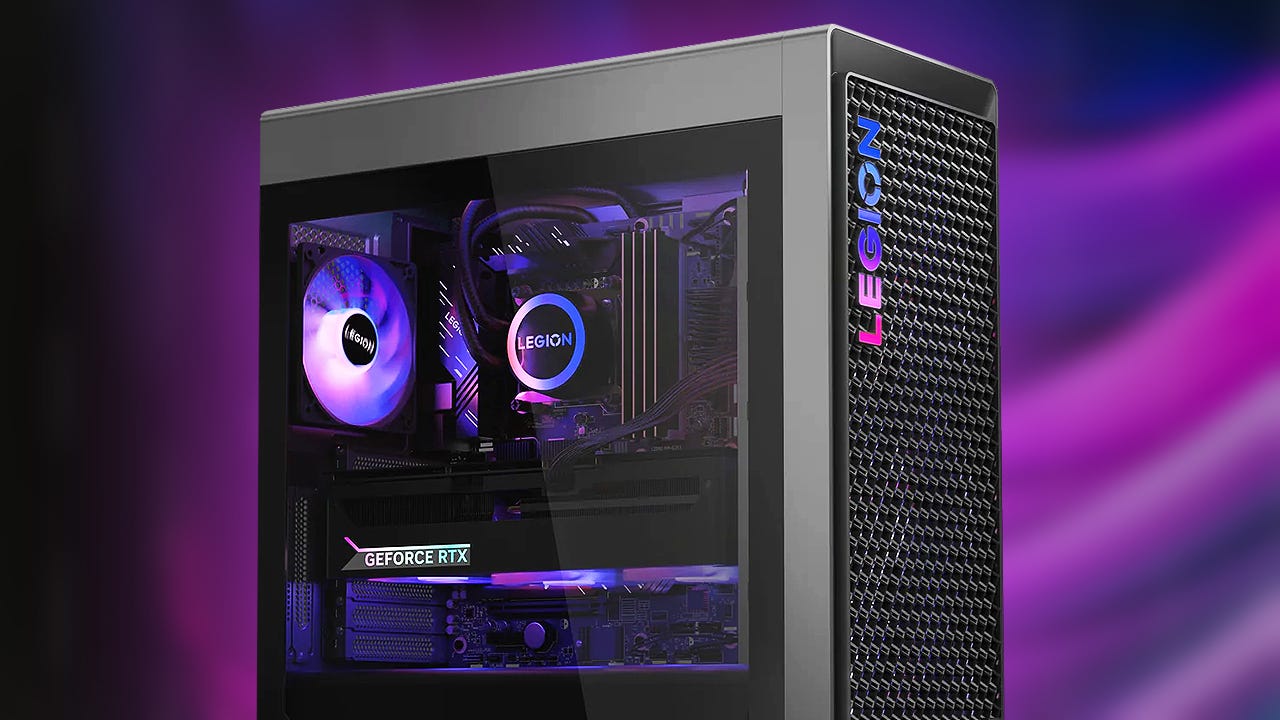
Save Over $1,000 Off Lenovo’s Most Powerful Legion Gaming PC with RTX 5090 Graphics Card
Lenovo’s most powerful Legion gaming PC just dropped to a new price low for a few days only. The Lenovo Legion Tower 7i Gen 10 gaming PC equipped with an Intel Core Ultra 9 285K processor and RTX 5090 graphics card is marked down to $4,079.99…
Continue Reading
-

iPhone 17 launch ignites frenzy in India as Apple’s “next China” takes shape
The iPhone 17 series has once again sparked a nationwide buying frenzy in India.
According to Indian media reports, on September 19, as Apple’s latest lineup reached stores, fans crowded retail outlets across the country. Lines stretched for…
Continue Reading

